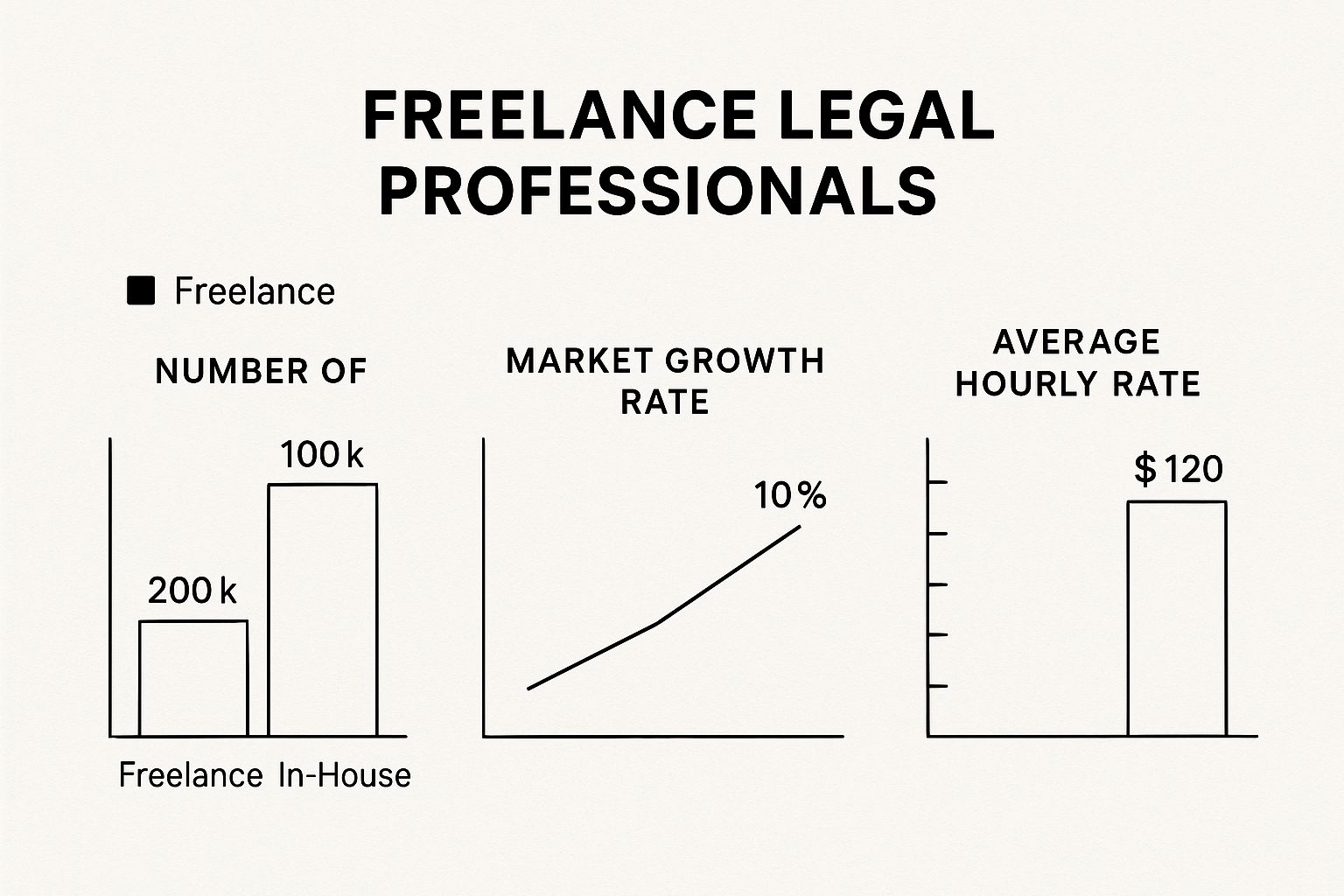
 16 minutes read
16 minutes read
Let's face it: the traditional way law firms hire is broken. Fundamentally broken. It’s a slow, expensive, and frankly, soul-crushing process that feels more like a lottery than a strategic business decision.
You post a job opening and brace yourself for the resume tsunami. Then comes the real fun: sifting through hundreds of applications, conducting endless interviews, and just hoping you stumble upon the right person. It's a massive gamble, and the house always seems to win.
This old-school system forces you into a terrible corner. You either pay a king's ransom for a full-time specialist you only need for one complex case, or you settle for a generalist who’s… well, "good enough." It's an impossible choice between mortgaging the office ping-pong table and settling for mediocrity.
The traditional hiring process is a black hole for your most valuable asset: time. Your top partners and senior associates get yanked from billable client work to play recruiter, spending their days chasing down references and trying to decode corporate buzzwords on resumes.
This isn't just an inconvenience; it’s a direct threat to your firm's agility and bottom line. In a world that moves at the speed of Slack, clinging to this old approach is like insisting on sending a fax. It’s slow, it’s painful, and it’s holding you back.
The freelance legal market isn't just a "trend." It's a seismic shift in how legal work gets done.

This isn't just a niche market anymore. It's a rapidly growing force offering a flexible, smarter way to access a massive pool of skilled legal pros.
The demand for top-tier legal talent is absolutely off the charts. According to the U.S. Bureau of Labor Statistics, the unemployment rate for lawyers is a shockingly low 0.9%, with paralegals right behind at 1.9%. Both numbers are miles below the national average.
What does this mean for you? It means we're in a candidate's market, and the best talent has their pick of the litter. Increasingly, they’re choosing the freedom and flexibility of freelance work. If you want the nitty-gritty, you can read about these demanding legal roles and the tight labor market.
Let's get down to brass tacks. Here's why the old way is failing and the freelance model is winning.
| Hiring Aspect | Traditional Model (The Headache) | Freelance Model (The Solution) |
|---|---|---|
| Time Commitment | Weeks or Months. Endless resume screening, multiple interview rounds, and background checks. A total time-suck. | Hours or Days. Quickly connect with pre-vetted specialists ready to hit the ground running. |
| Cost Structure | High & Fixed. Full-time salaries, benefits, payroll taxes, insurance, and that fancy espresso machine. | Variable & Predictable. Pay only for the hours worked or a flat project fee. Zero overhead. |
| Talent Pool | Local & Limited. Restricted to candidates within commuting distance. Quaint, isn't it? | Global & Deep. Access a worldwide network of experts with niche skills you can't find down the street. |
| Flexibility | Rigid. Locked into a long-term commitment, even when the work dries up. Ouch. | On-Demand. Scale your team up or down instantly. Like a thermostat for your headcount. |
| Risk | High. A bad hire is a costly, long-term mistake that's a nightmare to undo. | Low. Project-based work lets you "try before you buy," building relationships before committing. |
The verdict is in. Sticking with the old model isn't just inefficient—it's a competitive disadvantage.

This isn't about finding cheap labor; it's about finding the right expertise at the right time. The traditional hiring model was built for a world that no longer exists—one where talent was local, needs were predictable, and flexibility was a luxury.
It's time to stop letting a rigid, outdated hiring process dictate your firm's potential. The talent is out there, but you won’t find it using a playbook from 1995.
Let’s get one thing straight. When we talk about freelance legal jobs, we’re not talking about junior lawyers grinding through doc review in their pajamas. That old caricature is about as relevant today as a floppy disk.
The freelance legal world has grown up. Big time.
We’re seeing a massive shift, with seasoned pros deliberately stepping off the traditional partner track. Think former Big Law partners who’ve had enough of office politics and want to focus on high-impact work. Or the in-house counsel with a decade of specialized experience in data privacy, now serving as a consultant for three different tech startups. These aren't lawyers who couldn't "make it"—they're top-tier professionals who decided the old model was a raw deal.
The freelance talent pool today is a special-ops team for your firm. It’s an ecosystem of legal experts who can drop into a complex situation and start adding value from day one. This isn't about plugging a temporary gap with a warm body.
It’s about calling in a sniper, not hiring a security guard.
Here’s a taste of the talent you can tap into:

This career path is no longer a fallback plan. For a growing number of top-tier legal professionals, freelancing is a deliberate, strategic choice for more control, better work, and a bigger impact.
Understanding this is the key that unlocks a whole new reservoir of talent. The best lawyers are actively choosing this path because the freelance model offers what most traditional firms can't: autonomy. They get to pick their projects, set their hours, and sidestep the soul-crushing admin bloat that plagues so many practices.
They're trading brutal commutes and endless internal meetings for a career built on their actual legal skills. This isn't just about a "better lifestyle"; for many, it's a better way to practice law.
So when you hire a modern freelance lawyer, you’re not just getting an extra pair of hands. You're getting a focused, motivated expert who is there to solve your problem, not to climb your corporate ladder. And that, my friends, changes everything.

Still on the fence? Let's talk business. Thinking about freelance legal jobs as a temporary fix is like using a Ferrari for a grocery run. You're missing the point. Integrating freelance professionals into your firm isn't a trend; it's a strategic weapon.
The most obvious win is cost, but not in the way you think. This isn't about being cheap—it's about being ruthlessly efficient. You’re converting a massive fixed cost (a full-time salary plus benefits, PTO, and overhead) into a lean, variable cost. You pay for elite expertise precisely when you need it, and not a second longer.
Need a commercial contract expert for a three-month M&A deal? Hire one. Need specialized litigation support for a two-week trial prep? Done. No benefits packages, no long-term commitments, and zero dollars spent paying for someone's downtime. It’s a surgical strike, not a blind guess.
Beyond the bottom line, the real game-changer is how the freelance model obliterates the geographical limits that have handcuffed law firms for decades. Suddenly, your talent pool isn't your local metro area. It's the entire world.
This means you can finally find that niche regulatory expert who happens to live three time zones away. Or you can bring on that one-in-a-million paralegal with deep experience in a highly specific type of complex litigation. This isn't a convenience; it's a massive competitive advantage.
Let’s be honest: your best people are probably drowning in work that’s beneath their pay grade. Bringing in freelance talent allows your core team to offload the grunt work so they can focus on their highest-value, client-facing tasks.

It's not about replacing your team; it's about augmenting it. It's about building a legal machine that is agile, efficient, and brutally competitive. You stop paying for seats and start paying for results.
This isn’t just a theory. Freelancing is a global movement. The International Labour Organization reports that 46.5% of the global workforce is self-employed. And they're not slacking off—European freelancers average 43 hours per week, proving this is a serious career, not a side hustle.
This is your chance to build a firm that can scale on a dime, tackle any challenge, and operate with a level of financial discipline your competitors can only dream of.

Alright, you're sold on the idea. Now for the million-dollar question: where do you actually find these people? Let's be brutally honest—posting on a generic job board and praying for the best is a terrible strategy. It’s like fishing with a net full of holes. You’ll get a lot of noise and very little signal.
Finding elite freelance legal talent requires a surgical approach. You need to go where the pros are, not where the masses spray and pray with their resumes. Your time is too valuable to spend your afternoons fact-checking credentials and running interviews that go nowhere.
Think of your search as having three channels, each with its own quirks and pitfalls. There’s no single "best" way, but there's definitely a "best for you" way.
Specialized Legal Talent Platforms: These are the modern marketplaces built specifically for freelance legal jobs. Think of them as a highly curated talent pool where the first round of vetting is already done. The huge advantage here is speed and quality control. You get access to pre-screened pros, which cuts your own vetting time down to almost nothing. It's the fastest way to get a qualified shortlist. (Ahem. Toot, toot!)
Boutique Staffing Agencies: The old-school, high-touch approach. A good legal recruiter can be worth their weight in gold, but they'll charge you for it. They do all the legwork—sourcing, screening, interviewing—but you'll pay a significant premium. This makes sense for highly specialized, mission-critical roles where the cost is easily justified.
Your Professional Network: The "friends and family" plan. Tapping your network can unearth some hidden gems, and referrals come with built-in trust. The downside? It’s slow and unreliable. A great passive strategy if you're not in a hurry, but a terrible one when you needed someone yesterday.

Pro Tip: Don't just look for a good resume; look for a modern professional. The best freelancers are not just legal experts—they're tech-savvy operators who know the tools and workflows needed to be effective from day one.
The legal landscape is shifting under our feet, and tech is the earthquake. A recent Federal Bar Association survey revealed that 54% of legal pros now use AI for drafting correspondence and 47% use it for other legal tasks. Dig into more insights on how technology is reshaping the legal industry and what it means for your next hire.
This means your vetting process needs an upgrade. Don’t just ask about their legal experience; ask about their tech stack.
These aren't "nice-to-have" skills anymore. They're essential for efficiency. A freelancer who leverages technology is a freelancer who delivers better results, faster. If you're hunting for support roles, our guide on finding freelance legal assistant jobs can give you more specific advice.
Alright, let's get tactical. If you think hiring a freelance lawyer is just like bringing on a new associate, you're setting yourself up for a world of pain. The process is different, the stakes are higher, and a vague request will get you a vague—and unusable—result.
The $500 Hello. That's what a vague project brief costs you in wasted time and effort. This isn't about posting a generic job description. This is about precision. Your first step is to define the project with surgical clarity. Top-tier freelancers are drawn to clear, well-defined work because it signals that you’re a pro who knows what they need.
Think of your brief as an instruction manual, not a suggestion box. It needs to be crystal clear.

Hope you enjoy spending your afternoons fact-checking resumes and running technical interviews—because that’s now your full-time job if you get this wrong. A sharp project brief is your best defense against wasting time.
Once your brief is locked in, it’s time to find the right person. A polished resume is just the price of entry. It tells you where they’ve been, not how effective they are. You have to dig deeper.
Ask for a portfolio or sanitized work samples. Client testimonials are nice, but references you can actually speak with are gold. The interview should feel less like a Q&A and more like a strategy session. A great freelancer will ask you sharp, insightful questions, demonstrating their expertise before you've even made an offer.
Finally, nail down the operational details. Set clear communication expectations, define the scope to prevent "scope creep," and outline payment terms in a solid contract. These aren't just admin tasks—they are critical to success. This isn't just about finding talent; it's about building a framework for that talent to crush it.

Let’s be blunt. The old partner-associate pyramid is a relic. It's a rigid, expensive structure built for a different world. Clinging to it is a recipe for stagnation.
The future of law is a hybrid model: a lean, mean core team supported by a flexible, on-demand network of freelance specialists.
This isn’t about replacing your trusted associates; it’s about making them superheroes. It’s about building a firm that can scale up for a massive M&A deal one month and then scale back down the next—without the pain and cost of layoffs. Think of it as an elastic headcount.
This model gives you the agility to dive into fast-moving sectors like AI ethics or crypto regulation without missing a beat. Instead of spending six months hunting for the perfect full-time hire, you can bring in a top-tier expert for the exact time you need them.
This approach transforms your firm’s capabilities overnight. You're no longer limited by who happens to be on your permanent payroll. Suddenly, you can say "yes" to complex cases that were previously out of your league, all while keeping your overhead shockingly low.
The ability to hire a remote legal assistant in under 24 hours, for example, means you can instantly clear administrative backlogs that are killing your team's productivity.

Freelance legal jobs have moved from the fringe to the forefront. They are a central pillar of the modern, efficient law firm—a strategic tool for growth, not just a temporary fix.
The only question is whether you’ll lead this change or spend the next few years playing catch-up. Because this shift is already happening.
Look, we get it. Bringing in freelance legal talent can feel like a big shift, and you've got questions. Let's cut the corporate-speak and give you straight answers.
Yes, and often more so for specific tasks. Many of the best pros in the freelance legal jobs market are former Big Law partners or senior in-house counsel. They’ve chosen this path for autonomy, not because they lacked options.
Frankly, they've traded the corner office for project-based work that actually interests them. The key is to vet them for the specific niche expertise you need, just like any other senior hire.
This is non-negotiable. It's handled with rigorous screening and ironclad contracts. Any reputable platform or professional has a strict conflict-check process. We’ve been in these trenches; we get the stakes.

Before a single document changes hands, you get a signed NDA and a services agreement. This must clearly outline confidentiality obligations, data security protocols, and conflict procedures. Don't start work without it. Period.
It depends, but the math usually works out in your favor. While a top-tier freelance lawyer commands a competitive hourly rate, the total cost is almost always lower than a full-time hire.
Think about what you’re not paying for: benefits, payroll taxes, paid time off, office space, and bad coffee. You pay only for productive hours focused on your specific problem. It's a brutally cost-effective way to access elite expertise without the long-term financial hangover.
Stop gambling on generic job boards and start building a more agile firm. HireParalegals gives you on-demand access to a network of over 10,000 pre-vetted legal professionals, ready to start in as little as 24 hours. Find your perfect match today.